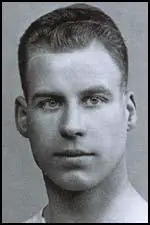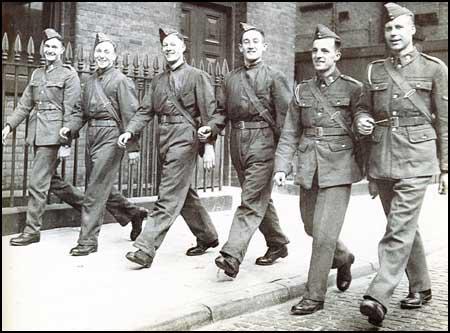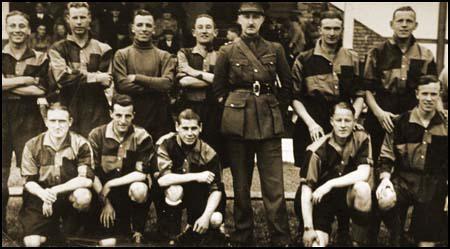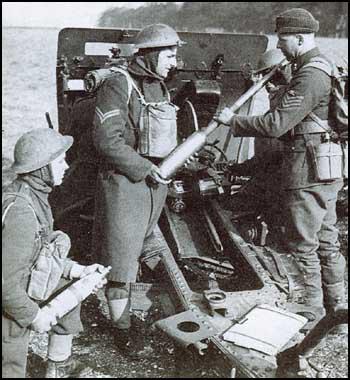Harry Goslin

Henry (Harry) Goslin was born in Willington on 9th November, 1909. He played for the Nottingham club, Boots Athletic before Charles Foweraker, the manager of Bolton Wanderers, signed him for a fee of £25 in 1930.
Goslin, a right half, made his debut in a 7-2 defeat at Liverpool but he kept his place in the first-team. In the 1932-33 season Bolton were relegated to the Second Division of the Football League.
After finishing 3rd in 1933-34 Bolton Wanderers achieved promotion in 1934-35 when the club finished 2nd to Brentford. That season Goslin did not miss a game and in 1936 Goslin became captain of the club. Under his leadership Bolton maintained its position in the First Division of the Football League.
As the authors of Wartime Wanderers point out: "Goslin was a tall, athletic, ramrod-straight man with piercing blue eyes, whose physical presence combined with his pleasant but firm personality made him the ideal choice for club captain. Under his astute leadership the club's fortunes improved." Married with two children, Goslin began preparing for his future and opened a sports shop in Bolton.
Goslin played in every game in the 1938-39 season and was considered as one of the best defenders in the country. During a nine year period he had scored 23 goals in 306 Football League games.
On 15th March, 1939, Adolf Hitler ordered the German Army to invade Czechoslovakia. It seemed that war was inevitable. On 8th April, Bolton Wanderers played a home game against Sunderland. Before the game started, Harry Goslin, the team captain, spoke to the crowd: "We are facing a national emergency. But this danger can be met, if everybody keeps a cool head, and knows what to do. This is something you can't leave to the other fellow, everybody has a share to do."
To show their committment to the cause, Harry Goslin, Jackie Roberts, Don Howe, Ray Westwood, Walter Sidebottom, Ernie Forrest, Jack Hurst, Stan Hanson, Billy Ithell, Albert Geldard, Danny Winter, George Caterall, Sid Jones, Charlie Hanks, Val Thompson and Tommy Sinclair decided to join the military or police service.
On Friday, 1st September, 1939, Adolf Hitler ordered the invasion of Poland. The football that Saturday went ahead as Neville Chamberlain did not declare war on Germany until Sunday, 3rd September. The government immediately imposed a ban on the assembly of crowds and as a result the Football League competition was brought to an end.
On 14th September, the government gave permission for football clubs to play friendly matches. In the interests of public safety, the number of spectators allowed to see these games was limited to 8,000. These arrangements were later revised, and clubs were allowed gates of 15,000 from tickets purchased on the day of the game through the turnstiles.

Harry Goslin of Bolton Wanderers join the Territorial Army in 1939.
The government imposed a fifty mile travelling limit and the Football League divided all the clubs into seven regional areas where games could take place. Goslin's club, Bolton Wanderers, was put in the North-East League.
Of the 35 players on the staff of Bolton Wanderers, 32 joined the armed services and the other three went into the coal mines and munitions. This included Harry Hubbick, who resumed his career down the pits and Jack Atkinson and George Hunt served in the local police force. A total of 17 players, including Harry Goslin, Danny Winter, Billy Ithell, Albert Geldard, Tommy Sinclair, Don Howe, Ray Westwood, Ernie Forrest, Jackie Roberts, Jack Hurst and Stan Hanson, joined the 53rd (Bolton) Field Regiment.
However, as no fighting was taking place between Britain and Germany, the men continued to play for their clubs in the North-East Regional League. Goslin played in four out of Bolton's 22 games in the 1939-40 season. He also played as a guest for Chelsea and Norwich City.
Unofficial international games also took place during the Second World War. On 2nd December 1939, Goslin was selected to play for England against Scotland at St James' Park, Newcastle.

Stan Hanson, George Catterall, (Lt Col G Bennet), Billy Ithell, Jack Hurst, Front
row: Albert Geldard, Don Howe, Ray Westwood, Jackie Roberts, Tommy Sinclair.
On 12th May, 1940, Adolf Hitler ordered the invasion of France. The 53rd (Bolton) Field Regiment was sent to help the French but came under attack from the advancing Panzer divisions. Harry Goslin was credited with destroying four enemy tanks and this resulted in him being promoted to the rank of Lieutenant. Goslin, Don Howe, Ray Westwood, Ernie Forrest, Jack Hurst and Stan Hanson, were lucky to make it back to the French port of Dunkirk where they were rescued by British ships.
The 53rd (Bolton) Field Regiment spent the rest of 1940 and the whole of 1941 at various army camps around Britain. According to the authors of Wartime Wanderers: They spent their time "building coastal defence constructions, manning anti-aircraft batteries and patrolling potential enemy landing sites all along the East Anglia coastline, variously stationed at Beccles, Nancton and Holt." This enabled them to play the occasional game for Bolton Wanderers in the North-East League.
On 3rd May 1941, Goslin was selected to play for England against Scotland. He also played against Scotland (4th October 1941) and Wales (25th October 1941).
On 15th July 1942, the 53rd (Bolton) Field Regiment was told to mobilise for overseas service. The following month they arrived in Egypt and immediately became involved in defending Alam el Halfa. On 30th August, 1942, General Erwin Rommel attacked Alam el Halfa but was repulsed by the Eighth Army. General Bernard Montgomery responded to this attack by ordering his troops to reinforce the defensive line from the coast to the impassable Qattara Depression. Montgomery was now able to make sure that Rommel and the German Army was unable to make any further advances into Egypt.

On 22nd October 1942, the 53rd (Bolton) Field Regiment took up battle positions. The following day General Bernard Montgomery launched Operation Lightfoot with the largest artillery bombardment since the First World War. The attack came at the worst time for the Deutsches Afrika Korps as Erwin Rommel was on sick leave in Austria. His replacement, General George Stumme, died of a heart-attack the day after the 900 gun bombardment of the German lines. Stume was replaced by General Ritter von Thoma and Adolf Hitler phoned Rommel to order him to return to Egypt immediately.
The Germans defended their positions well and after two days the Eighth Army had made little progress and Bernard Montgomery ordered an end to the attack. When Erwin Rommel returned he launched a counterattack at Kidney Depression (27th October). Montgomery now returned to the offensive and the 9th Australian Division created a salient in the enemy positions.
Winston Churchill was disappointed by the Eighth Army's lack of success and accused Montgomery of fighting a "half-hearted" battle. Montgomery ignored these criticisms and instead made plans for a new offensive, Operation Supercharge.
On 1st November 1942, Montgomery launched an attack on the Deutsches Afrika Korps at Kidney Ridge. After initially resisting the attack, Rommel decided he no longer had the resources to hold his line and on the 3rd November he ordered his troops to withdraw. However, Adolf Hitler overruled his commander and the Germans were forced to stand and fight.
The next day Montgomery ordered his men forward. Lieutenant Harry Goslin and the 53rd (Bolton) Field Regiment joined the pursuit. The Eighth Army broke through the German lines and Erwin Rommel, in danger of being surrounded, was forced to retreat. Those soldiers on foot, including large numbers of Italian soldiers, were unable to move fast enough and were taken prisoner.
The British Army recaptured Tobruk on 12th November, 1942. During the El Alamein campaign half of Rommel's 100,000 man army was killed, wounded or taken prisoner. He also lost over 450 tanks and 1,000 guns. The British and Commonwealth forces suffered 13,500 casualties and 500 of their tanks were damaged. However, of these, 350 were repaired and were able to take part in future battles.
After spending time in Baghdad, the 53rd (Bolton) Field Regimentmoved to Kirkurk on 8th January 1943. They were eventually relocated to Kifri which was to become their main base for the next five months. While there Harry Goslin, Stan Hanson, Don Howe and Ernie Forrest played for the British Army against the Polish Army in Baghdad. Howe scored one of the goals in the 4-2 victory.
The 53rd (Bolton) Field Regiment joined General Bernard Montgomery and the 8th Army in the invasion of Italy. On 24th September, 1943, Goslin and his men landed at Taranto. Three days later the men had reached Foggia without too much opposition. However, when the men were ordered to cross the River Sangro the regiment took part in some of the most difficult fighting of the Second World War.
At the end of November Don Howe was wounded and evacuated to a dressing station. After another enemy air attack Ray Westwood and Stan Hanson came close to being killed. The shelling continued and on 14th December, 1943, Harry Goslin was hit in the back by shrapnel. He died from his wounds a few days later. The Bolton Evening News reported: "Harry Goslin was one of the finest types professional football breeds. Not only in the personal sense, but for the club's sake, and the game's sake. I regret his life has had to be sacrificed in the cause of war."
